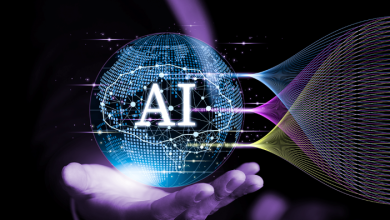
The concept of AI Agents making decisions alongside us once felt like science fiction – but that reality could arrive as soon as this year. Unlike traditional automation, Enterprise AI Agents are transforming how we work, blending human expertise with AI capabilities in entirely new ways. We’re at a critical point in AI’s story, when it is evolving from a helpful assistant to a key decision-maker, marking a transformative shift in how we use this technology.
How do AI Agents differ from assistants?
There’s some ambiguity as to exactly what an AI Agent is, but fundamentally, it is an intelligent tool that can perform knowledge tasks by understanding and interacting with its environment. The AI Agent system works autonomously on behalf of an organisation as a digital worker, and is designed with an “innate” decision-making power that ensures it can be proactive, take initiative, and exert control over its actions and environment. AI Agents can be deployed to any environment or sector, moving beyond what traditional automation and Generative AI have achieved in the modern digital workforce.
Much of the global population is aware of AI assistants – from Alexa and Siri to ChatGPT – and these differ from AI agents in that they are primarily designed for conversational interactions. They engage in back-and-forth dialogue with users, responding to text, image or speech-based inputs. These assistants are reactive, simulating human-like conversations to provide responses to queries and maintain conversational context. For example, an AI Assistant can write code, analyse and structure data, or compose an article. However, while it can draft the code, it cannot independently implement or test it, fetch or insert data, or create a presentation from the article. AI Assistants, while flexible and capable AI systems that can provide valuable insights, lack the agency to perform a task without being prompted. Fundamentally, these AI systems are idle until interacted with by a human.
Deploying AI Agents in the workforce
In contrast, AI Agents have a level of agency that can move beyond AI Assistants and take independent action. AI Agents open up new pathways and provide solutions for more complex requests, all while collaborating and working within the same parameters as the human workforce. AI Agents have the power to continuously learn from live data, meaning they can make decisions that would typically require human cognition – all without straying outside dictated territories.
Where AI Agents excel is in their infinite scalability, possessing intelligent reasoning levels that rival human capabilities. Being powered by generative AI capabilities and natural language programming means that we can communicate fluently with AI Agents in a way that mimics interacting with coworkers. Imagine being able to interact with a digital worker that can adapt to different scenarios, learn from previous experiences, and respond with a solution all in plain English – even if it has not been specifically trained on that prompt. And, with AI Agents able to analyse vast datasets rapidly, they can fulfil a wide range of tasks efficiently – from the routine to the complex. When we think of an AI Agent in the workforce, consider it as a co-worker that always works remotely.
What is an Enterprise AI Agent?
An Enterprise AI Agent refers to an AI Agent that is seamlessly connected to enterprise applications, and can understand the immense scope of data that these organisations work with.
To deploy AI agents in an enterprise environment, they must meet strict prerequisites, such as operating within instructions defined in plain English rather than coded in. The agent is required to run 24/7, be able to autonomously perform tasks without constant human oversight, and improve itself by learning from previous tasks. Crucially, the agent has to honour information security and governance frameworks, be fully transparent, and offer an audit trail behind its reasoning.
Enterprise AI agents are scaled to process vast amounts of information autonomously, and within robust security structures. Having these boundaries in place ensures that they benefit the enterprise without constant human intervention. Ultimately, an Enterprise AI Agent should save time and help restructure workforces to deliver services with optimal efficiency.
What makes Enterprise AI Agents revolutionary?
Take the insurance sector as an example, which pays out an average of £22 million per day in insurance claims and spends considerable time and effort validating those claims. Introduce an AI Agent into the equation, and the request can be processed in the background, during and outside business hours, without human supervision. An AI Agent can analyse the claim’s validity, contact a client, make decisions on the next steps, and execute them.
Customer service is another high-value area for deploying AI Agents, which until now, has been focused on minimising customer call levels. Processes have been optimised, FAQs have been pointed to, and chatbots with selection trees have exploded in popularity – all to resolve queries in the first instance, without customers needing to engage with time-crunched customer service teams.
AI Agents transcend these capabilities, and their deployment means that organisations want their customers to reach out, and are equipped to handle their requests. AI Agents can respond immediately, understanding context, history, and natural language as they engage in detailed discussion. Crucially, an AI Agent can resolve queries without putting a customer on hold or transferring them to another colleague.
AI Agents provide a level of time and value to organisations that means every query, every claim, and every question can be investigated and resolved as if it were the only one an organisation received that week. Able to understand a customer’s historical relationship with an organisation, AI Agents also have the intelligence to understand all the products and solutions a specific company offers, and as such, can make real-time suggestions and sales proposals that are tailored to a customer. This is a groundbreaking trait of AI Agents in which they are surpassing traditional customer service, where employees often follow generic sales scripts.
AI adoption: No longer a futuristic ambition but a business necessity
The conversation and developments around AI won’t wait for laggards. No longer a fun novelty, this is an indispensable survival tool for any modern business. Organisations that delay adopting will fall behind, given that AI’s rapid advancements have the potential to revolutionise industries and workforce structures. Agentic AI tools can learn, adapt, and drive more thoughtful decision-making across organisations and their specific contexts, resulting in new organisation charts and unparalleled productivity. Think of it as employing a new team member, but the onboarding process takes place in seconds, and its ability to complete complex tasks is almost immediate.
The dawn of AI Agents mirrors the seismic shift that we saw with the internet in 1995. We’re on the verge of fully understanding the opportunities and transformations that AI Agents will bring. And, in contrast to the internet revolution, which primarily focused on improved access to information, the rise of AI Agent’s are centered around the transformed nature of work itself. Increasingly, we’ll see employees become digital experts, and service providers will evolve into software solutions. This change will fundamentally challenge our perception of what work means in enterprise settings and blur the lines between human and synthetic workers.
As AI matures, the workforce must catch up
Traditional job roles are already evolving, with a 2025 WEF survey estimating that 22% of work tasks are performed mainly by machines and algorithms. With even greater exposure to Generative AI tools in the workplace and the incoming deployment of AI Agents, the workforce dynamics will shift dramatically, creating a stronger human-technology blend. The same WEF survey reported that by 2030, employers expect the proportional share of tasks performed by humans and technology to be nearly evenly split. As with any industrial revolution, technological advances will lead to job cuts, but they will also present new opportunities. Workers will need to become more versatile and adaptable around AI, and AI Agents will create opportunities for new positions in the workforce – such as overseeing and training these tools and leading education around engaging with this technology.
As skill sets grow obsolete, it’s time to address the burgeoning AI literacy gap
Enterprise AI agents will have a tangible and noticeable impact on the workplace, moving beyond enhanced productivity to a restructuring of the workplace in which AI agents have decision-making power. In just a few years, humans will be working alongside autonomous AI Agents, and without plugging the AI literacy gap today, industries will struggle to capitalise on the impending industrial revolution.
Right now, the education gap around AI is at a critical inflection point. A 2024 survey found that 70% of workers likely need to upgrade their AI skills, and this digital divide needs to be plugged for the full potential of AI to be realised. It is a fact that the human workforce will be working alongside AI, and in many contexts, it already is. Unfamiliarity with new technologies or fear of job displacement can cause workforces to resist training opportunities, meaning tech and business leaders are responsible for communicating the benefits of AI adoption and providing reskilling opportunities as the workforce evolves. WEF’s 2025 Future of Jobs report found that workers can anticipate that nearly two-fifths (39%) of their current skill sets will change or become obsolete during the 2025-2030 timeframe. Our workforce is changing, and the need for skill sets to evolve is more prevalent than ever. AI isn’t a technology that will disappear into the hype cycle, so it is paramount that business leaders are proactive in providing regular, consistent, and engaging training for their workforce.
Meet your newest colleague
AI Agents will not change the world or the workforce overnight – industrial revolutions take time. However, this doesn’t mean we should wait until it is too late to prepare for its impact. The effects of AI agents are already being felt, with conversations taking place on how to manage and take advantage of their transformational impact. We’re moving from software as a service, to service as software, and as organisations prepare for this new era of technology, it’s up to business leaders to arm their workforce with the best skills to collaborate with AI and prepare them to meet their newest colleagues – Enterprise AI Agents.





